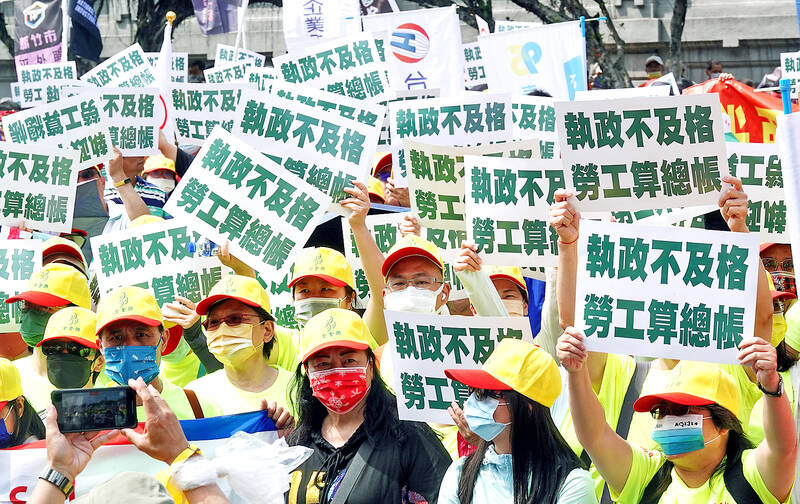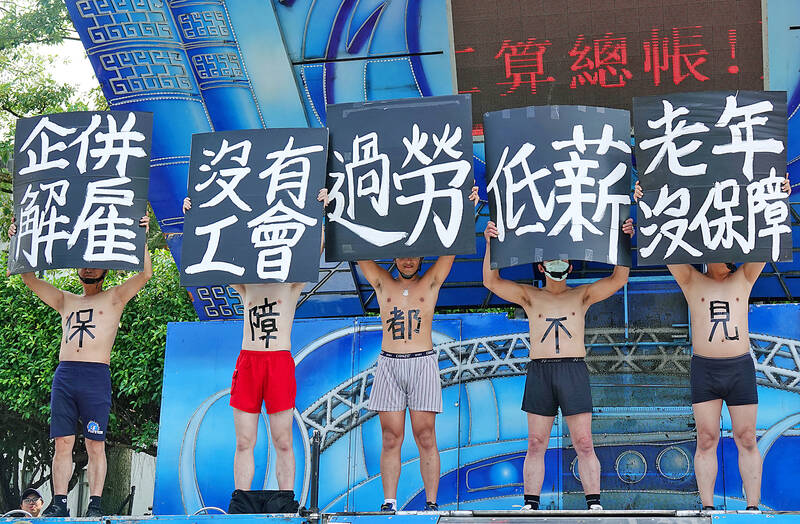Workers and their supporters yesterday took to the streets of Taipei to mark International Workers’ Day with demands for the government to offer better labor welfare.
While passing Democratic Progressive Party’s (DPP) headquarters in Taipei, the protesters tore hand-held signs that resembled election ballots, protesting the government’s “failed” labor policies.
Event organizer May 1 Action Alliance yesterday said about 5,000 people took part in the rally.

Photo: CNA
The alliance demanded that the government address the failures of its two touted labor amendments, which were to address low wages and labor pension reforms, and protested the exploitation of medical personnel during the COVID-19 pandemic.
The protesters demanded that the government reinstitute seven national holidays that were rescinded in a 2016 labor reform.
The reform sparked protests from workers and labor groups at the time, as workers would not be eligible for additional pay if scheduled to work on those days, amounting to a pay cut.

Photo: CNA
Alliance leader and Taiwan Confederation of Trade Unions president Chiang Chien-hsing (江健興) said that average wages for workers were decreasing each year due to employers being “unwilling to share the fruits of success” with those who made profits possible.
Despite increases to the minimum wage for seven years in a row, the rate pales in comparison the rise of commodity prices, Chiang said.
Taiwan ranks fifth on the international scale of working hours, and the government should endeavor to lower working hours and increase wages, he said, adding that long hours and low wages are part of the reason Taiwanese are becoming more reluctant to have children.
Chiang said the government must draft legislation to ensure that the labor insurance fund remains healthy.
The government must also lower thresholds for union formation to help protect labor rights, he added.
The Ministry of Labor yesterday said in response that the 47 percent rise in the minimum wage over seven years — from NT$120 (US$3.90) in 2016 to NT$176 this year — demonstrates the government’s commitment to protecting labor rights.
As of 2021, the average hours worked in Taiwan stood at 41.6 hours, compared with 43.9 hours in South Korea and 42.5 hours in Japan, the ministry said.
However, the government is continuing to make efforts to better help workers balance their jobs and family needs through policy adjustments, it added.
The NT$16 billion it is scheduled to invest over the next four years should help 800,000 young people secure jobs, it said, adding that amendments to the Labor Standards Act (勞動基準法) are planned to provide better working conditions and quality of life.
Separately, President Tsai Ing-wen (蔡英文) marked International Workers’ Day by thanking essential workers for safeguarding the people of Taiwan throughout the COVID-19 pandemic.
Tsai on social media recognized the efforts of workers from across society for collectively maintaining economic and social stability over what she described as a challenging three years.
Tsai said that it is imperative for the government to now provide more consideration and care for workers, particularly given an adverse outlook for the global economy in the year ahead.
The government since 2016 has been making concerted efforts to slash workers’ economic burdens with measures to increase the minimum wage, cut taxes and implement diverse social welfare programs, Tsai said.

The High Prosecutors’ Office yesterday withdrew an appeal against the acquittal of a former bank manager 22 years after his death, marking Taiwan’s first instance of prosecutors rendering posthumous justice to a wrongfully convicted defendant. Chu Ching-en (諸慶恩) — formerly a manager at the Taipei branch of BNP Paribas — was in 1999 accused by Weng Mao-chung (翁茂鍾), then-president of Chia Her Industrial Co, of forging a request for a fixed deposit of US$10 million by I-Hwa Industrial Co, a subsidiary of Chia Her, which was used as collateral. Chu was ruled not guilty in the first trial, but was found guilty

‘DENIAL DEFENSE’: The US would increase its military presence with uncrewed ships, and submarines, while boosting defense in the Indo-Pacific, a Pete Hegseth memo said The US is reorienting its military strategy to focus primarily on deterring a potential Chinese invasion of Taiwan, a memo signed by US Secretary of Defense Pete Hegseth showed. The memo also called on Taiwan to increase its defense spending. The document, known as the “Interim National Defense Strategic Guidance,” was distributed this month and detailed the national defense plans of US President Donald Trump’s administration, an article in the Washington Post said on Saturday. It outlines how the US can prepare for a potential war with China and defend itself from threats in the “near abroad,” including Greenland and the Panama

DEADLOCK: As the commission is unable to forum a quorum to review license renewal applications, the channel operators are not at fault and can air past their license date The National Communications Commission (NCC) yesterday said that the Public Television Service (PTS) and 36 other television and radio broadcasters could continue airing, despite the commission’s inability to meet a quorum to review their license renewal applications. The licenses of PTS and the other channels are set to expire between this month and June. The National Communications Commission Organization Act (國家通訊傳播委員會組織法) stipulates that the commission must meet the mandated quorum of four to hold a valid meeting. The seven-member commission currently has only three commissioners. “We have informed the channel operators of the progress we have made in reviewing their license renewal applications, and

A wild live dugong was found in Taiwan for the first time in 88 years, after it was accidentally caught by a fisher’s net on Tuesday in Yilan County’s Fenniaolin (粉鳥林). This is the first sighting of the species in Taiwan since 1937, having already been considered “extinct” in the country and considered as “vulnerable” by the International Union for Conservation of Nature. A fisher surnamed Chen (陳) went to Fenniaolin to collect the fish in his netting, but instead caught a 3m long, 500kg dugong. The fisher released the animal back into the wild, not realizing it was an endangered species at